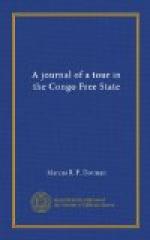One day as I was sitting after lunch half asleep, a green and white serpent glided through the open door into my room. It happened that my guns were leaning against the opposite wall and I did not fancy jumping over the beast, so simply shouted. It then withdrew on to the verandah and I followed as quickly as possible with a gun. In the meantime Chikaia came running up and gave it several blows on the back with a heavy piece of wood. The sentry then appeared and before I could stop him cut off its head. The skin was thus spoilt which was a great pity as it measured more than ten feet in length.
As it was not easy to procure paddlers at Enguetra I decided to send on one of the boys Mavunga with some of the heavy baggage on November 17th and to follow him the next day. He was very nervous at the idea of travelling alone and wished to borrow a revolver, but this of course I refused. It is curious that these coast boys fear the natives of the interior so much and still more curious that the presence of a single white man at once restores confidence. It is indeed becoming more apparent every day that the natives have a very genuine respect and admiration for the Europeans and credit them with powers which neither they nor any other people possess.
I leave Enguetra on the 18th in a most comfortable canoe with an awning so high that it is possible to stand upright, a great luxury in canoe travelling. The Likati flows swiftly through dense forests and we glide down the rapids very quickly and comfortably. No villages exist along the banks and nothing is visible except the forest until we reach Kati-kati a clearing in which a mud hut has been erected for the convenience of travellers. I went for a stroll in the forest but after half an hour was stopped by an unpleasant palpitation of the heart. Although the distressing symptom passed away quickly it was obvious it might occur again and then I realised for the first time that I was very anaemic and that hard exertion would be impossible for some time. This was the more annoying for the country around was particularly rich in game. We leave at sunrise which is, however, concealed by a thick water mist and speed along until we reach Dzamba or Ekwanga-tana close to the point where the Likati and Rubi rivers join to form the Itimbiri. Dzamba is a transit port where cargoes are transhipped from canoes into a small steamer the Milz which plies between it and Buta the capital of Uele. As the Milz departed the next day I decided




